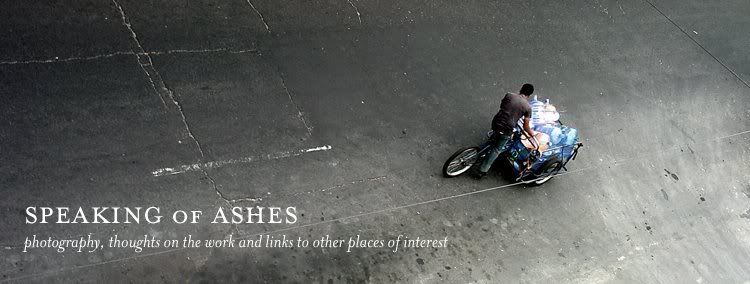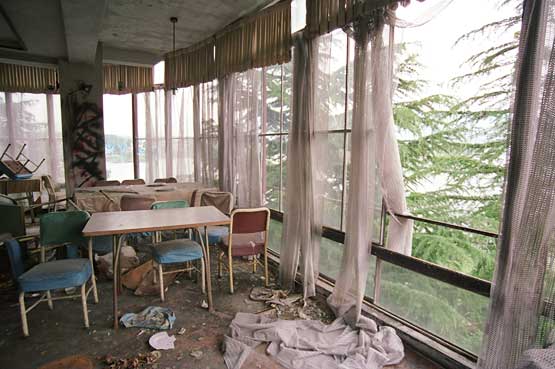 i thought i would take a stab at answering Gusky's very thoughtfully posted question:
i thought i would take a stab at answering Gusky's very thoughtfully posted question:
Some have replied that ego is the drive to make one's mark in the world. I suppose that's another side of ego, the side related more to a will to power and self-assertion.
The questions that this drive raises are, "What kind of mark, and where, and why?"
I'd think that the artist whose need to leave a mark on the world is the dominant drive should be asking him/herself the more basic question of why it's the dominant drive. What inner need does this drive to leave marks in the world satisfy?
Conveniently, another post cropped up,
Alain's really fascinating presentation/ discussion at Long Sunday of the David Graeber article in Harper's which I've not read. Now I can't blame Gusky for leaving out the Altruism side of things, as I'd never thought of it either. I would probably approach ego from the sort of clinical perspective of western psychology myself. Graeber's approach, seems to suggest that both Ego and Altruism arise simultaneously as a product of market economy. To clip Alain's quote of Graeber:
In the ancient world, for example, it is generally in the times and places that one sees the emergence of money and markets that one also sees the rise of world religions - Buddhism, Christianity, and Islam. If one sets aside a space and says, "Here you shall think only about acquiring material things for yourself," then it is hardly surprising that before long someone else will set aside a countervailing space and declare, in effect: "Yes, but here we must contemplate the fact that the self, and material things, are ultimately unimportant." It was these latter institutions, of course, that first developed our modern notions of charity.
Pretty fascinating really. At least I thought so. Graeber goes on to critique the role of these two factors, egoism and altruism, in a discussion of left versus right politics arguing that the right has established a monopoly on both ego and altruism, Value and Values. And for this, Alain's discussion is quite good, the left will flail helplessly forever unless it can take hold of one. Frighteningly, I have to clip from Alain's quoting of Graeber once more:
why do working-class kids join the army anyway? Because, like any teenager, they want to escape the world of tedious work and meaningless consumerism, to live a life of adventure and camaraderie in which they believe they are doing something genuinely noble. They join the army because they want to be like you.
Of course, we have heard this argument raised before... (someone leave a comment telling me where was that bit about working class kids becoming artists because it is higher status than they could otherwise achieve,) and I don't believe it is anything but on the mark. As Gusky wants to know, what inner drive does this mark-making want to satisfy? Is it just, again, escaping tedium and consumerism? I fear often enough it is. Here of course I could predictably go off on my usual rant about higher education, elitist institutions and the right-wing. (Please, close Yale already.) But I will spare you.
I think I am probably on the same page as Gusky, in wanting more art and less ego, more art where the artist is transparent. Where an artist is conducting the fluid motion of meaning through elements and into the waiting ~mind~ of the recipient, and where the recipient is understood broadly to include the artist and the environment also. All of us are participants in that environment, and we understand art to be a kind of play that we do to increase our understanding of ourselves in our environment. It isn't altruism after all. I suspect Gusky will agree.
Doing what we do is just more work and that work, like any work, fails when it serves the ego. Take a look at Donald Trump or Michael Jackson, two pathetic
IQ-around-50 imbeciles whose attempts to successfully conquer their own miserly egos has resulted mostly in continued and spectacular failure. Do I need to mention the so-called leader of the free-world ?
In reflecting on Gusky's original question, I think it helps to point out that the ego is a construct successfully engineered for the western mind and one which has out-shown the utility of western economic thinking. We've created a world in which genius cannot lead because the entire apparatus of communication is arrayed against that shining historical ego. What we have now is the marketed personality judged only by its sale-ability and hence the goons of the New York gallery scene, hence the goons of MSNBC, hence the GOP. Ego-less art will be decidedly emasculated and profoundly personal, almost limp to those still carrying egos. But don't confuse its veracity by judging it with the Western Ego. It will have no borders and it won't carry well in glossy magazines.
It will probably sell. Just not enough to impress.
 For something like 8 months of the past year, a good half of my traffic came from people looking for a "big truck" on Google France and Google Mozambique and Google all over the freaking world... So here it is again. I tried deleting the picture, and then the whole post and still they come. Oh well, hope to see all you big truck fans again in 2007. As a gesture of good will, Big Truck Salvage is here. Big-Big-Truck is here. There is a picture of a Gigantic Truck here. And an Enormous Truck here. But sadly, I cannot find a truck of my friend Serioshka's description, the mythical Ginormous Truck (that's /jai-NOR-mus/). Scratch that. Actually, a quick search lead me to this, the Ginormous Truck.
For something like 8 months of the past year, a good half of my traffic came from people looking for a "big truck" on Google France and Google Mozambique and Google all over the freaking world... So here it is again. I tried deleting the picture, and then the whole post and still they come. Oh well, hope to see all you big truck fans again in 2007. As a gesture of good will, Big Truck Salvage is here. Big-Big-Truck is here. There is a picture of a Gigantic Truck here. And an Enormous Truck here. But sadly, I cannot find a truck of my friend Serioshka's description, the mythical Ginormous Truck (that's /jai-NOR-mus/). Scratch that. Actually, a quick search lead me to this, the Ginormous Truck.































